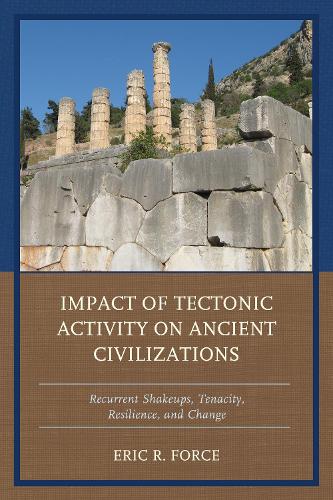
Impact of Tectonic Activity on Ancient Civilizations: Recurrent Shakeups, Tenacity, Resilience, and Change
(Hardback)
Available Formats
Publishing Details
Impact of Tectonic Activity on Ancient Civilizations: Recurrent Shakeups, Tenacity, Resilience, and Change
By (Author) Eric R. Force
Bloomsbury Publishing PLC
Lexington Books
27th August 2015
United States
Classifications
Professional and Scholarly
Non Fiction
Social and cultural anthropology
Ancient history
Archaeology by period / region
551.8
Physical Properties
Hardback
212
Width 162mm, Height 236mm, Spine 21mm
472g
Description
Impact of Tectonic Activity on Ancient Civilizations: Recurrent Shakeups, Tenacity, Resilience, and Change observes a remarkable spatial correspondence of zones of active tectonism (i.e. plate boundaries in the earths crust) with the most complex cultures of antiquity (great ancient civilizations), and continues to explore the meaning of this relationship from a number of independent angles. Due to resulting site damage, this distribution is counter-intuitive. Nevertheless, systematic differences between tectonic and quiescent cultures show that tectonic activity corresponded in antiquity with more cultural dynamism. Data of several independent types support direct cultural influence of tectonism, including vignettes of the impact of tectonism in specific ancient cultures. An expectation of change seems to be a feature such tectonic cultures shared, and led to an acceleration of development. These dynamics continue though much obscured in the present day.
Reviews
Force posits that they [quakes] may have rocked the cradles of past civilizations. . . .[The author] pursues [his thesis] tenaciously and with considerable skill. . . .Forces speculation remains an intriguing possibility. * Nature *
Eric Force presents an impressive portrayal.... A book that should be in every library that focuses on the archaeological and geological sciences.... The thoughts are interesting, and, at the end, one wants to hear more from the author. * Journal of Eastern Mediterranean Archaeology and Heritage Studies *
Deftly analyzing geological, archeological, and anthropological data, Eric Force presents an insightful, but somewhat provocative thesis: Ancient civilizations in tectonically active settingsdespite suffering short-term setbacks from earthquake, volcanic, or other natural disastersin the long term have flourished and influenced societal development, whereas most civilizations in tectonically quiescent regions have not. This book is a must read for anyone curious about why this should be the case. -- Robert I. Tilling, Volcano Science Center, U.S. Geological Survey
If you want to challenge your views of the ancient world and understand how brilliant and resilient our ancestors were then read this book. Too often we slip into the lazy assumption that tectonic pressures result in long term disasters, this book turns that view on its head; our ancestors responded to these pressures and turned them to their long term advantage. We need to relearn these lessons today. -- John Grattan, Aberystwyth University
Author Bio
Eric R. Force is adjunct professor at the University of Arizona and a practicing geologist with field research spanning fifteen countries.
